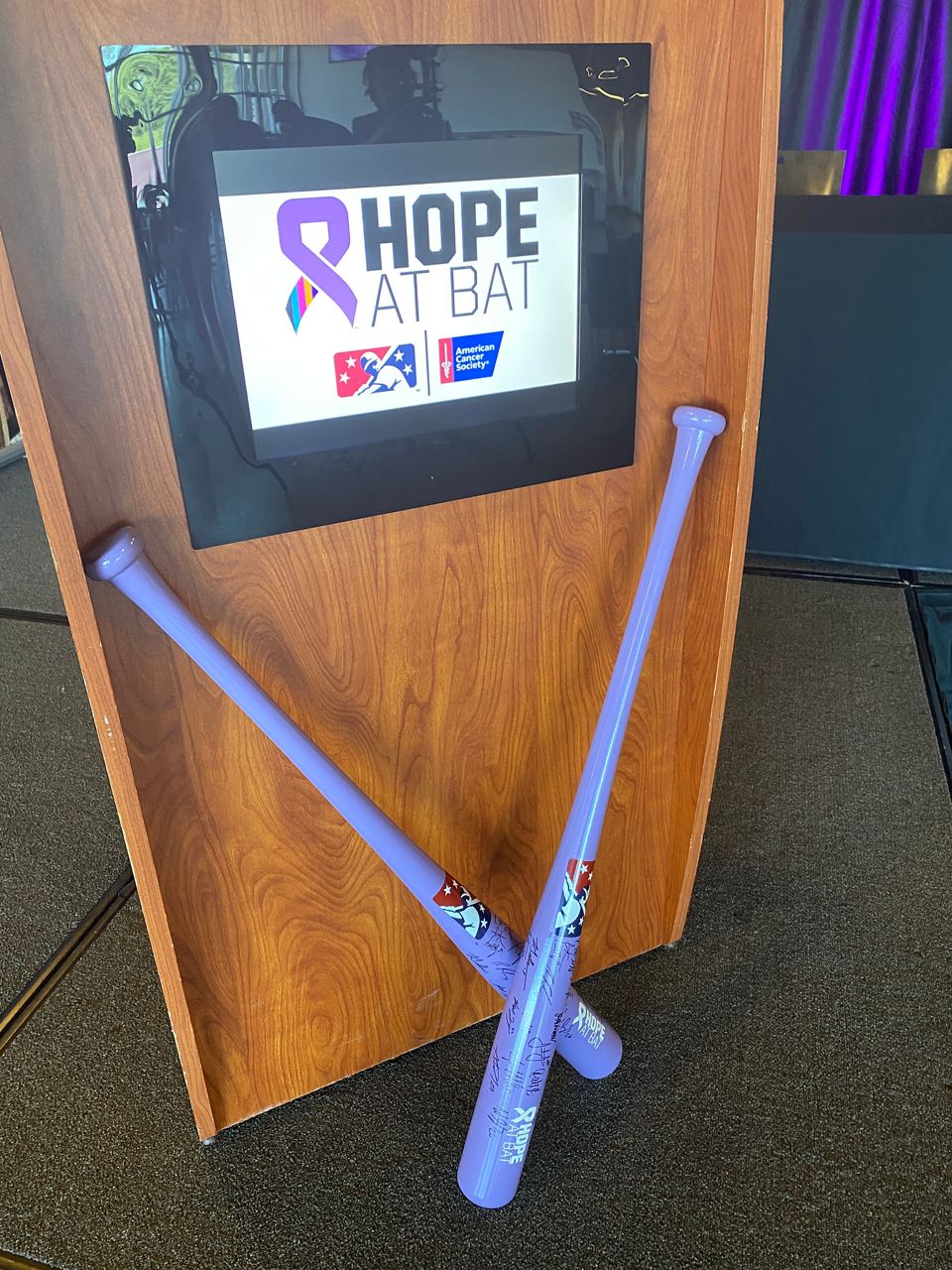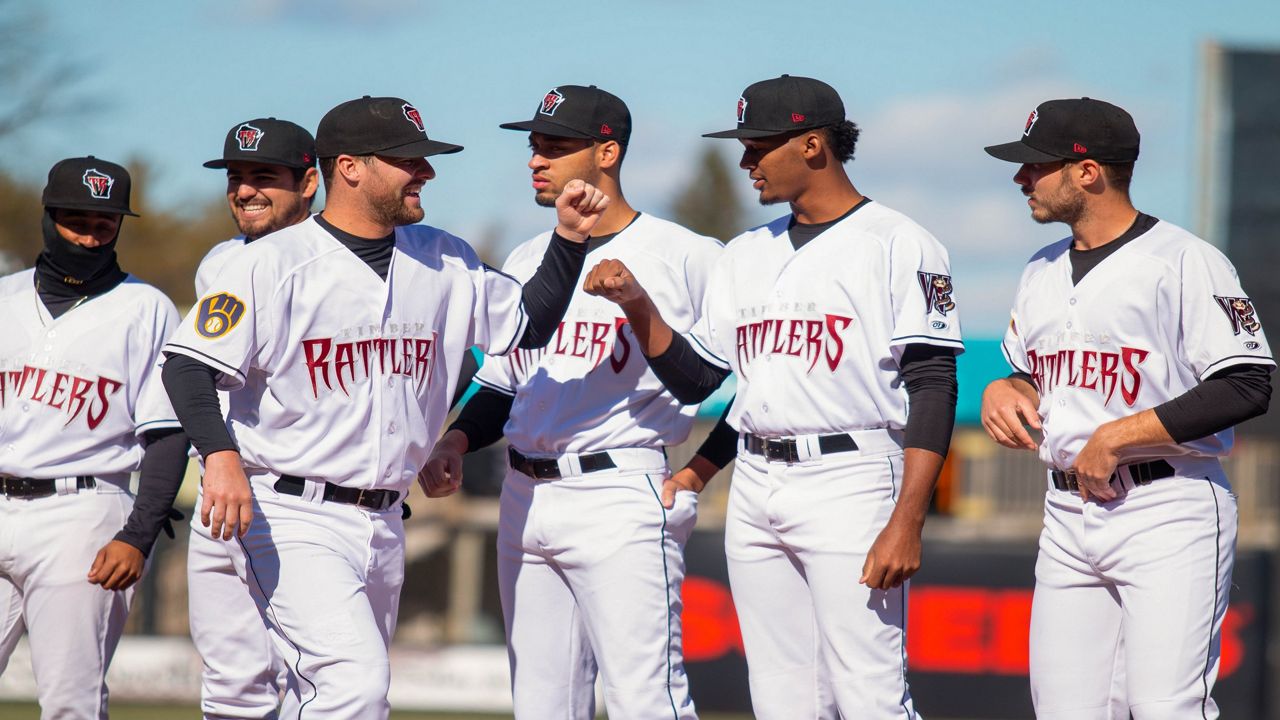GRAND CHUTE, Wis. — Tyler Gillies remembers exactly what he felt when the doctor came into the office and told him what that lump on his neck was.
What You Need To Know
- The Wisconsin Timber Rattlers, Minor League Baseball and the American Cancer Society have partnered to start the “Hope at Bat” campaign.
- The campaign raises funds for cancer research and educates fans on how they can reduce their cancer risk.
- For more information, fans can visit the MiLB website
- Tyler Gillies, a relief pitcher for the Timber Rattlers, is a two-time cancer survivor
“Panic,’’ said Gillies, a relief pitcher with the Wisconsin Timber Rattlers, when told he had Hodgkin’s lymphoma in 2019. “As a 24-year-old, you never expect to hear you got cancer, especially as a professional athlete. Thought I was pretty healthy at that time.’’
But he was told that the type of cancer was highly curable, and after six months of chemo, he thought life was business as usual. But then a few months later it came back. More chemo, stem cell treatment and immunotherapy enabled Gillies to beat back the disease once more.
“Baseball was always a light at the end of the tunnel,’’ he said.
On Wednesday, the Wisconsin Timber Rattlers, Minor League Baseball and the American Cancer Society announced a new initiative called the “Hope at Bat” campaign, with the hope it will provide a light at the end of the tunnel for cancer patients and survivors everywhere.
J.W. Cannon of the American Cancer Society said 1.9 million new cancer cases were diagnosed in 2021.
“But here’s the good news,’’ he said. “The risk of dying from cancer in the United States has decreased over the past 28 years, with the death rate for men and women, combined, falling 32%.’’
Cannon said the campaign raises funds for further research and to educate baseball fans.

“It serves as a really important vehicle for us to educate fans about how decisions they make every day could impact their cancer risk,’’ he said. “From understanding their family health history, living a healthy lifestyle and how it impacts their cancer risk. The importance of age-appropriate screening.’’
Jeff Lantz, senior communications manager for Minor League Baseball, said Minor League Baseball will donate $1 for every at-bat on Thursday across 60 minor league games. In addition, all 120 teams will sign two purple bats. One will be auctioned off at each local stadium and proceeds raised will go to a local cancer charity. The other bat will be part of a national online auction with proceeds going to the American Cancer Society’s national campaign.
Gillies said he’s been cancer free for about a year-and-a-half, but the road back has been long. He lost roughly 60 pounds and said getting back in shape, regaining his velocity, getting his shoulder healthy and getting a feel for his mechanics is ongoing.
“We’re still working on it, but we’ve made a lot of progress,’’ he said.
And much like hearing he had cancer the first time, the celebration of his return to the mound on April 16 in Beloit is burned into his memory.
“It was exactly three years from the first time I got on the mound as a Timber Rattler,’’ he said. “So I had to take a second to take it all in. Actually, they told the umpire and the other team that when I came in we’re going to take a moment. That was pretty cool for me. I wasn’t expecting it. I just wanted to pitch at that point.’’
He had the ball in his hand, and goosebumps on his arms.
“When they announced me, the umpire stepped back, the batter stepped back and everyone in the stadium and both teams were applauding,’’ he said, “which was a nice moment.’’
Gillies said he learned a lot about resiliency during his comeback from cancer, and he’s relying on that now as he tries to regain his form. But he also learned something else.
“It definitely puts things in perspective,’’ he said. “Having a rough day on the mound yesterday just doesn’t seem so bad when you’re healthy and being able to play a play a game for a living again. If you’d had asked me in the middle of my stem cell transplant what it’d be like to get back out on the mound, I wasn’t sure I’d be able to get back there. There were definitely some low points.
“So being back out there, especially after being here in 2019, is pretty special.”
Story idea? You can reach Mike Woods at 920-246-6321 or at: michael.t.woods1@charter.com



